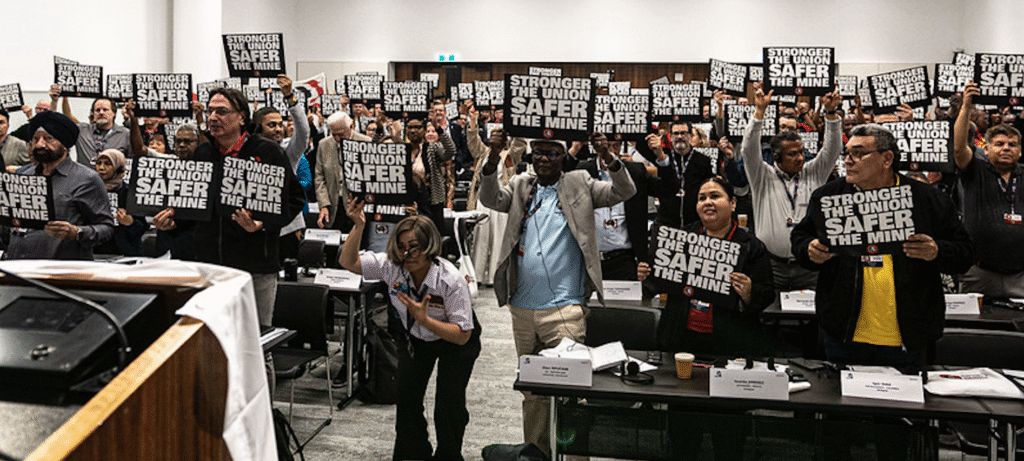Read this article in:
English
- Español
3 November, 2025The mining and diamonds, gems, ornaments, jewellery, and processing (DGOJP) industries, long a cornerstone of global supply chains, are undergoing a deep transformation. Surging demand for battery metals including copper, cobalt, lithium, and nickel fuels the green-energy turn, while rare earths underpin everything from wind turbines to electric vehicles.
The gold price has rebound even as lab-grown diamonds erode the sparkle of natural gems. Automation and artificial intelligence are reshaping operations, causing job losses, and disrupting work.
At the IndustriALL Global Union world mining conference in Sydney, Australia, 2 November, 200 delegates from 35 countries convened to navigate these developments and develop trade union strategies. The conference is a build up to the IndustriALL 4th Congress which begins on 4 November. Panels dissected critical issues on climate change and a Just Transition for workers, global minerals governance and human rights due diligence (HRDD) in supply chains, corporate accountability through campaigns, and cross-cutting challenges like occupational health and safety (OHS) alongside gender dimensions of the changing mining industries.
Conference presentations cited the importance of IndustriALL’s participation in the UN panel on critical energy transition minerals which is recommending fairness, transparency, investment, sustainability, and HRDD along the minerals value chain.
The conference discussed coal’s twilight with projections suggesting that nearly a million jobs could vanish by 2050, yet comprehensive redeployment plans remain elusive. IGBCE cautioned on the need for planning in coal mine closures drawing from Germany’s experience when over 600 000 jobs were lost. In South Africa, 100,000 coal miners face job losses without reskilling lifelines while Colombia continues to rely on coal as an economic resource and mineworkers fearing imminent closure of these mines without a Just Transition framework in place.
However, IndustriALL is advocating for a Just Transition rooted in foresight with anticipatory policies to smooth disruptions, robust social safety nets, and innovative, worker-led retraining schemes. Decent green jobs must prioritise security and inclusive social dialogue must involve unions, mining companies, governments, and communities.
In Australia, union lobbying secured the Net Zero Economy Act, a blueprint for decarbonisation. Unlike Europe and other continents, Australia does not have social dialogue and co-determination mechanisms. Other highlights included South Africa’s upskilling and reskilling programme, Just Transition in Indonesia’s coal regions, and SINTRACARBON’s initiative on the Just Transition.
“Economic diversification in the renewable energy transition is critical, and this should come with resource support as most countries in the Global South lack the infrastructure to unlock mineral wealth and to beneficiate mineral resources necessary for industrialization, which proposal the African Mining Vision makes,”
said Kemal Ozkan, assistant general secretary.
Tributes to Brazil’s 2019 Brumadinho dam disaster underscored the perils of lax environmental oversight, while India’s privatisation push has bred precarious work which is eroding job security. Concerns were raised at India’s appalling mine safety records.
Speakers said workers continue to endure assaults on fundamental rights including union-busting, curbs on freedom of association and collective bargaining, plus fatalities and ailments from poor working conditions. Wages remain paltry, especially in the Global South’s mines, where families scrape by. Women workers grapple with gender-based violence and harassment and campaigns should be launched for gender equity and the setting up of lactating facilities for breast feeding mothers.
Further, Chinese multinationals often violate workers’ rights and ignore national labour laws and international standards. The conference urged trade unions to develop strategies to curb the abuses.
Importantly, discussions stressed that unions are countering violations with vigour and creating union-to-union solidarity networks, from company-specific networks targeting multinationals to commodity specific networks. For example, USW Canada and SVS in Madagascar cooperated on workers’ rights at QMM Fort Dauphin.
Unions hailed the Initiative for Responsible Mining Assurance (IRMA) as the only framework granting worker representation prompting mining companies to develop rival, less rigorous, industry driven alternatives like the Consolidated Mining Standard Initiative (CSMI). The conference discussed how voluntary standards can play a role in closing accountability gaps.
The conference’s plan of action chart a bold course and roadmap. Delegates pledged to bolster Global North-Global South mineworkers solidarity, amplify inclusion via Women in Mining initiatives and youth programmes, foster dialogue with indigenous groups, share OHS best practices, and lobby for ratification of ILO Convention 176 on safety and health in mines.
Further strategies target precariousness and campaigning for workers’ rights, living wages, and coordination with the ILO and IRMA. Organising drives will span multinationals, regions, and locales, encompassing sub-sectors from coal and iron ore to gold, diamonds, and jewellery. A global gold network, with Barrick and AngloGold Ashanti, has been launched.
Due diligence in critical minerals will get a push, via training on leveraging it for bargaining and rights protection. The battery supply chain remains a priority, drawing from auto-sector strength to aid mineworkers. Additionally, mining unions will work with energy affiliates, enterprises, and governments, and strengthen networks through research and mobilization.
“Democracy isn’t confined to ballots and parliament benches. Trade unions embody it in the workplace, and they must shape industrial policies to unite communities and the working class,”
said Grahame Kelly, Mining and Energy Union (MEU) general secretary.
“We need responsible and sustainable mining practices and responsible sourcing linkages to improve workers conditions, improve community livelihoods, respect indigenous peoples’ rights, and the environment. But this can only happen if unions organize in the supply chain where workers and human rights are respected,”
said Glen Mpufane, IndustriALL director for mining and DGOJP.
Cathy Drummond from USW and Stephen Smyth from MEU were elected co-chairs for the mining and DGOJP industries.
